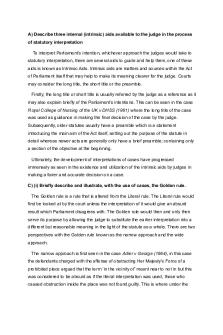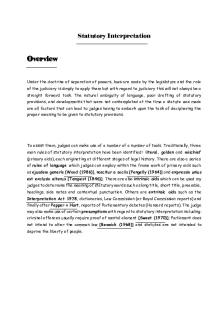Latin Maximus in Statutory Interpretation PDF

| Title | Latin Maximus in Statutory Interpretation |
|---|---|
| Author | Michelle Mu |
| Course | Foundations of Law |
| Institution | Monash University |
| Pages | 1 |
| File Size | 142 KB |
| File Type | |
| Total Downloads | 96 |
| Total Views | 130 |
Summary
Download Latin Maximus in Statutory Interpretation PDF
Description
Latin Maximus in Statutory Interpretation Ejusdem Generis Meaning: “of the same kind” - Where the words can be grouped together into a list of specific items or category Example: - Wills Act: “A will may be revoked by burning, tearing or otherwise destroying it” Does writing “cancelled on it or scribing on it suffice? o NO, because the category established is physical destruction and writing ‘cancelled’ is not considered as physical destruction Noscitur a sociis Meaning: “A word is known by its associates” - The meaning of a word should be determined by considering the words with which it is associated in the context. Example: - “…if a person shall unlawfully and maliciously stab, cut or wound” (R v Ann Harris, 1936). o In this case V’s nose was bit off by A o The question is can biting fit into this context o NO, as the wound has to be brought about/as a result of the stabbing or the cutting and thus biting cannot be applied here Reddendo singula singulis Meaning: “By rendering each his own” - Where a text exhibits the pattern “A and B are Y and Z”, reddendo suggests that A should be matched with Y and B should be matched with Z, achieving a sort of symmetry in the text. Example: - “Any person who buys any marijuana or cocaine without a chemist permit or a doctor’s certificate commits an offence”. - Here: o Marijuana = chemist permit o Cocaine = doctor’s certificate Expressio unius est exclusio alterius Meaning: “The express mention of one thing is to the exclusion of others.” - when one or more things of a class are expressly mentioned others of the same class are excluded....
Similar Free PDFs

Statutory Interpretation in Malaysia
- 12 Pages

Statutory Interpretation
- 6 Pages

Statutory Interpretation
- 6 Pages

Statutory Interpretation
- 3 Pages

Statutory Interpretation
- 5 Pages

Statutory Interpretation
- 11 Pages

Statutory Interpretation
- 6 Pages

Statutory interpretation notes
- 2 Pages

Statutory Interpretation 70102
- 5 Pages

Statutory Interpretation Notes
- 9 Pages

Statutory Interpretation Notes
- 4 Pages
Popular Institutions
- Tinajero National High School - Annex
- Politeknik Caltex Riau
- Yokohama City University
- SGT University
- University of Al-Qadisiyah
- Divine Word College of Vigan
- Techniek College Rotterdam
- Universidade de Santiago
- Universiti Teknologi MARA Cawangan Johor Kampus Pasir Gudang
- Poltekkes Kemenkes Yogyakarta
- Baguio City National High School
- Colegio san marcos
- preparatoria uno
- Centro de Bachillerato Tecnológico Industrial y de Servicios No. 107
- Dalian Maritime University
- Quang Trung Secondary School
- Colegio Tecnológico en Informática
- Corporación Regional de Educación Superior
- Grupo CEDVA
- Dar Al Uloom University
- Centro de Estudios Preuniversitarios de la Universidad Nacional de Ingeniería
- 上智大学
- Aakash International School, Nuna Majara
- San Felipe Neri Catholic School
- Kang Chiao International School - New Taipei City
- Misamis Occidental National High School
- Institución Educativa Escuela Normal Juan Ladrilleros
- Kolehiyo ng Pantukan
- Batanes State College
- Instituto Continental
- Sekolah Menengah Kejuruan Kesehatan Kaltara (Tarakan)
- Colegio de La Inmaculada Concepcion - Cebu




